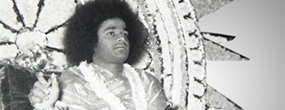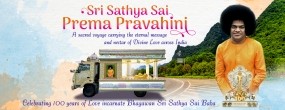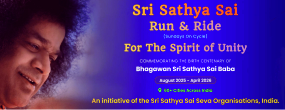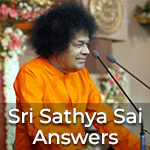DiscoursesWorld Conferences

Discourse Date
18 May 1968

Place
Mumbai

Occasion
World Conference Sri Sathya Sai Seva Organizations

Discourse Collection
Sri Sathya Sai Speaks, Vol 8 (1968)
THE Sanathana Dharma (Eternal Religion) propounded in Hindhuism is, as the Himalayas, supreme, sovereign, rich, comforting, calm and protective; why then should people crave for volcanoes spitting fire and smoke, raking up the evil passions in man? It is as cleansing as the waters of the Ganga in which no poisonous bacteria can live; why then seek the waters of the sea which cannot quench human thirst, but can only make it more acute? Alien cultures cannot suit the people of this land, for they have grown in this atmosphere for centuries; tiffs culture is the best, for people of all climes and stages of life. It is universal; it is for all time. Regional differences of climate, crops, terrain and history may emphasise some virtues more than others; they may lead to the prescription of some restrictions more than others. But, the common aim of the sages and saints of all lands is to lead man towards God and prevent him from sliding down into the level of the beast. Man must earn equanimity; he must be firmly established in truth and love. That will make his heart reflect the Lord within. When the road laid down for man’s uplift is overgrown with thorny bush and becomes unrecognisable, the Lord Himself takes human form and marks it out again.
Mind Can Be Controlled By Intense Meditation
Dharma-sthapana, as the restoration of righteousness is called, consists of two operations: the removal of wrong and the establishment of fight. At the present time, the one means by which both these can be attained is – Namasmarana (recital of God’s Name). Dharma is capable of conferring all that man wishes for, here and hereafter. It is the Kamadhenu (the celestial cow) that grants all boons. With the nama (Name of God) as a rope, you can tie her to the post – the tongue; then, you can get from that Kamadhenu all the good that you crave for. She will rest in your heart-stall. In the beginning, this Namasmarana is best done in company. For, when you do it alone, distracting thoughts will overpower the earnestness. A single fibre of grass has little strength; but twist a large number into a rope, you can bind with it a rogue elephant to a tree! The wild mind can be bound by faith that is confirmed in godly company. Arjuna complained to Krishna against the wildness of the mind; he said, it was chanchala (always changing its objectives), pramadhi (full of dangerous possibilities since it makes man a slave of the senses), balavath (uncontrollable) and dhrudham (difficult to destroy). But, the mind can be controlled and even eliminated by means of intense dhyana (meditation) on the Immanent God. When that stage is reached, anger, anxiety and envy will cease bothering you; the bonds of ‘I’ and ‘Mine’ will break; and you will have shanthi (undisturbed peace). Your efforts must be in proportion to the grandeur of the gain you envisage, isn’t it? You crave for bliss, but cling to smaller pleasures and refuse to stake as much as is needed to win it.
Be Prepared For All The Travail To Gain An End
There was a Sulthan once, who heard of the Mahabharatha, which the Hindhus revere as the fifth Veda; he commissioned a Hindhu Poet of his kingdom to write a Mahabharatha, with him as the hero who wins the empire back. He threatened the poet with dire punishment if he did not complete it within a stipulated time. The poet had to agree; but he pretended he was at it, and told the Sulthan that he himself is being portrayed as the eldest of the Pandava brothers and the other ‘four brothers’ were his viziers. He said, that in the Mahabharatha he was writing, the enemies of the Sulthan were the Kauravas. This made the Sulthan very happy and he became restless, to read the epic as soon as it was finished. The poet, however, delayed long. One day when asked the reason, the Poet told the Sulthan, “Your Majesty! I am awaiting clarification of one simple matter from you; it is giving me a lot of trouble, this problem. The queen is, in my epic, the counterpart of the queen of the eldest of the Pandavas; this is as it should be, since you are eldest of the five heroic brothers. But, in the original Mahabharatha, she is the wife of all the brothers. In my poem, your viziers are those brothers; they are allotted those roles in this new version. Now, shall I depict the queen as the wife of the viziers also, or…” The Sulthan did not wait to hear the rest; he threw the entire project overboard…and sent the poet way.
When you are eager to gain an end, you must be prepared for all the travail, all the obstacles or else, you should not entertain the wish. The five brothers are the five Pranas (vital airs) in the human body and all of them constitute one entity, and Dhroupadhi, born of Fire, is the energy that activates the body. When this is ignored and the epic is taken as a story of kings and queens and dynastic wars, the meaning is missed.
All Men Do Not Have Equal Rights Or Obligations
Every member of the Sathya Sai 0rganisation has to be a sadhaka (spiritual aspirant), one who is practising the discipline of conquering his egoism and greed, mamakaram and abhimanam (the sense of ‘I’ and ‘mine’). The President, Vice-President and Secretary must be keener than the members in this endeavour, and must be examples for the rest. These offices should not be regarded as positions of authority or ‘prizes’ for devotion. They must be accepted with humility and exercised with love towards the members and the public. Love all; respect all; serve all. But do not believe all have equal fights, obligations and duties. You cannot say that all cows are equal and purchase them, by the dozen. Some may be dry, some may require more feed, some may give less milk, some may be young, some decrepit – so, you have to distinguish and decide. Not all cars are equal. Nor are all men. The Dharma (Code of Conduct) for each has to be different for it is decided by changing factors like age, profession, status, authority, scholarship and also by considering whether a person is a male or female, teacher or pupil, master or servant, child or youth, father or son, dependent or free. But the basic principles of Dharma are Sathya, Prema, Sahana and Ahimsa – Truth, Love, Fortitude and Non-violence. The various codes, written or unwritten, are only elaborations of these basic principles.
Study Of Samskrith Must Be Taken Up First
There is much criticism nowadays about the Varna ashrama dharma (codes of conduct laid down in the past, for the four castes and the four periods of life); but, there is no constructive approach, because those who try to tamper with it have no knowledge of the Shasthras (scriptures) where it is propounded, nor have they experience of those codes in their daily life. Samskrith is the language of the Shasthras and the sacred texts of Sanathana Dharma (eternal universal religion). So, Sathya Sai Organisation must provide facilities for the study of Samskrith, by elders and by the children. This is one of the first things that they must take up. The tragedy is that the very Pandiths, who are the repositories of Samskrith learning, do not teach the language to their children, though they clamour for greater recognition of their own scholarship. Samskrith learning is fast disappearing as a result of this suicidal neglect. The fact is the atmosphere is fouled by hypocrisy and insincerity. No one stands up boldly and proclaims his conviction, and acts according to it. Pandiths praise that ancient scriptures, but do not take even elementary steps to ensure that they are preserved and studied. Leaders of the people who decry the English language on platforms send their children to schools where English is the sole medium of instruction! No member of the Sai Organisations should practise this deceit. They must be sincere practitioners of what they profess. That is the Dharma.
We can distinguish four types among men: The highest type are those who are so good themselves that they are utterly disinclined to note the faults of others, those who, therefore, see everybody as only righteous and virtuous. The middling type are those who see the good as good, and the bad as bad. The lower type are those who accept only the bad and ignore the good. Finally, the lowest, the worst are those who judge the bad alone as good and enforce its acceptance.
Strive To Rise Up To The Highest Type Of Men
You have to avoid the last type and the third one and strive to rise up to the second and the first. All the rules and disciplines that have been prescribed by this Conference for your activities are for helping you in this spiritual effort. They are intended for your benefit, not for heightening My authority. So far as I am concerned, there is only one rule that binds you to Me; the Rule of Love. That love will inspire you, instruct you, quieten and comfort you.











































